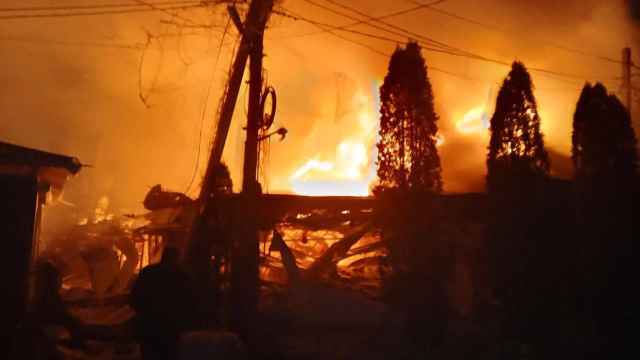PARIS — Russia may have to raise interest rates and tighten rules on lending next year to crack down on inflation, the OECD said on Tuesday.
"More tightening will probably be required in 2013 to gain credibility in the run-up to a more formal inflation targeting regime," the Organization for Economic Cooperation and Development said in its annual economic outlook.
Russia is gradually moving from a policy regime that targets the ruble's exchange rate towards that of inflation targeting, which involves tighter control of interest rates and a greater role for official inflation targets.
A rise in inflation above the Central Bank's formal 5-6 percent target range for 2012 led the bank to raise policy rates by 25 basis points in September, although a recent moderation in inflation has eased pressure for further imminent hikes.
While higher inflation mostly resulted from a poor harvest and a delayed increase in regulated prices, core inflation had also risen, suggesting that price pressures were feeding through into other sectors, the OECD said.
It forecast that the average monthly rate of consumer price inflation would rise to 6.4 percent in 2013 from 5 percent in 2012. But it expected that inflation would fall gradually towards the Central Bank's policy target of 4-5 percent in 2014.
While some economists are concerned that tighter monetary policy would exacerbate a deepening economic slowdown, the OECD was relatively optimistic about the country's growth prospects.
It forecast that growth in gross domestic product would rebound to 3.8 percent in 2013 and 4.1 percent in 2014, from 3.4 percent this year. It anticipated higher oil prices, an easing of headwinds from the euro-zone crisis and domestic consumption growth driven by low unemployment and rising real wages.
However, the OECD was concerned over the long-term impact of additional government spending promised by President Vladimir Putin, who won the election for a third Kremlin term earlier this year.
"It is uncertain how electoral spending promises that amounted to a cumulative 6 percent of GDP by 2018 will actually be implemented, but they might contribute to overheating," the report warned.
Risks of a slowdown in economic growth in Russia exceed inflation risks and will continue until the end of 2012 and into the start of 2013, Deputy Economic Development Minister Andrei Klepach told journalists on the sidelines of a forum on Tuesday, Interfax reported.
"[This trend will continue] until the end of this year and into the start of next year," he said. Klepach said that equilibrium between the risks of economic growth slowdown and inflation concerns still has not been recovered. "Anyway, there is a more pressing problem, which is economic growth," he said.
A Message from The Moscow Times:
Dear readers,
We are facing unprecedented challenges. Russia's Prosecutor General's Office has designated The Moscow Times as an "undesirable" organization, criminalizing our work and putting our staff at risk of prosecution. This follows our earlier unjust labeling as a "foreign agent."
These actions are direct attempts to silence independent journalism in Russia. The authorities claim our work "discredits the decisions of the Russian leadership." We see things differently: we strive to provide accurate, unbiased reporting on Russia.
We, the journalists of The Moscow Times, refuse to be silenced. But to continue our work, we need your help.
Your support, no matter how small, makes a world of difference. If you can, please support us monthly starting from just $2. It's quick to set up, and every contribution makes a significant impact.
By supporting The Moscow Times, you're defending open, independent journalism in the face of repression. Thank you for standing with us.
Remind me later.





